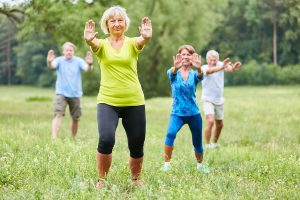 Seniors are taking up martial arts in numbers. I don’t mean we’re learning deadly combat with Karate or Jiu-Jitsu. Older adults make up the largest group of people learning Tai Ji Quan, known as Tai Chi.
Seniors are taking up martial arts in numbers. I don’t mean we’re learning deadly combat with Karate or Jiu-Jitsu. Older adults make up the largest group of people learning Tai Ji Quan, known as Tai Chi.
Tai Chi improves leg strength, cardiovascular endurance, flexibility, immune system, sleep, and the ability to concentrate and multitask. I’d say that’s a lot of benefits.
Tai Chi for Seniors Improves Balance
But in my opinion, the biggest attraction of this technique is that it greatly improves balance, thus preventing falls and fractures. To anyone who’s had to endure the consequences of a fall, this is a big plus.
I highly recommend Tai Chi for seniors beginning a fitness program, recovering from an injury or who want skills that will grow their ability.
According to the Journal of Sport and Health Science, Tai Chi originated in China approximately 400 years ago (1600 AD) and continued to evolve until it was introduced to the public about 100 years ago. The 24-form is the most common, but is often simplified into 8- or 16-form routines. Learning and practicing those forms is beneficial for the brain, body and so much more.
Brain Benefits from Martial Arts
The key thing for seniors is that those activities which require multiple movements at the same time are challenging and hugely beneficial for the brain. They help maintain and grow neurons, crucial for aging seniors. Even though we start with around 100 billion, by our 20s this number begins to decline.
Physical Benefits of Tai Chi
Tai Chi incorporates dynamic actions with controlled movements and coordination. Long-term sustained practice improves the function of the nervous, cardiovascular, respiratory and musculoskeletal systems. It improves balance, prevents falling and improves overall strength.
Tai Chi Benefits for the Brain
Like many martial arts, Tai Chi is typically practiced in group sessions. There is a social element. Many instructors incorporate meditation, mindfulness and intentional breathing into sessions. When you add the sense of accomplishment from learning something new, you’re primed for a boost in psychological well-being.
When it comes to learning how to age well, our grandparents and parents didn’t have the same possibilities we do. They just accepted aging and grew older―and usually weaker and sicker―without questioning it. We don’t have to fall into that trap.
We have options, including the ancient practice of Tai Chi. Many gyms and fitness centers offer classes, as well as local Y’s and senior centers. Try it out.

Recent Comments